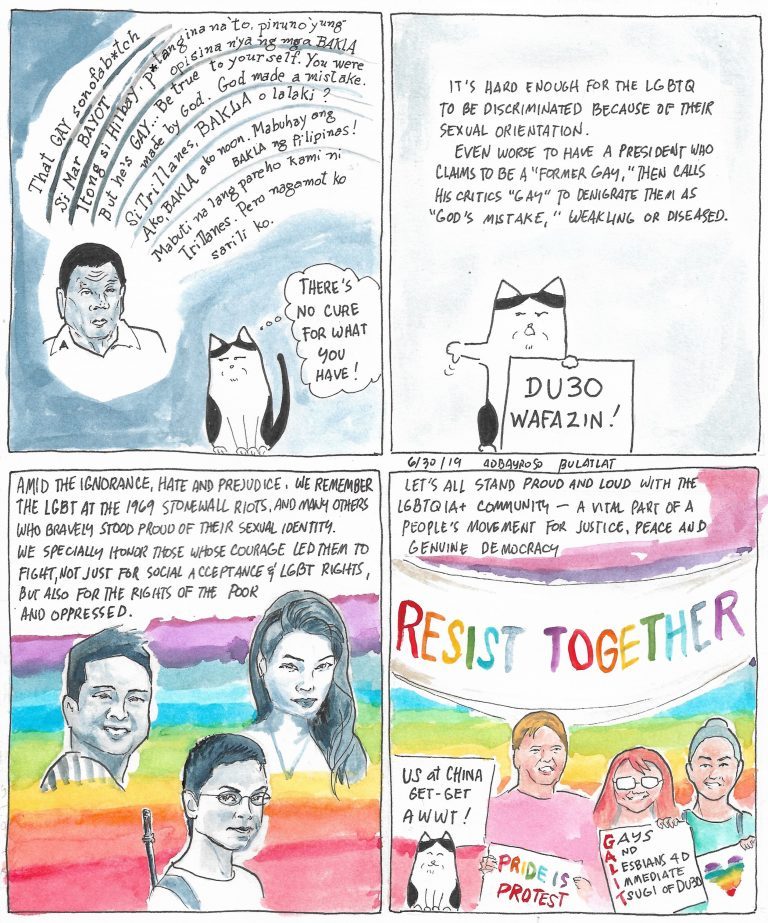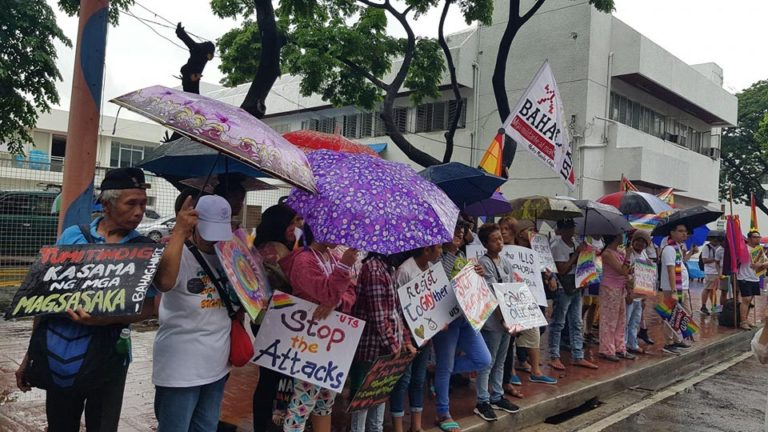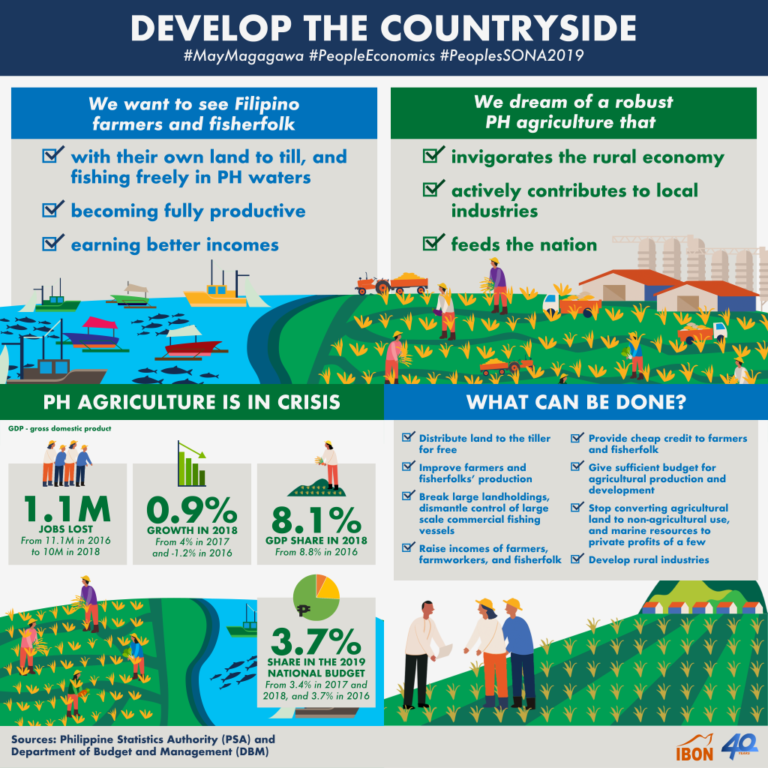On June 28, 2019, the 14th
Division of the Court of Appeals dismissed the petitions for the writ of amparo
and habeas data filed by Karapatan, Rural Missionaries of the Philippines
(RMP), and Gabriela. Karapatan assailed the decision and referred to it as “a
gross disservice to the human rights defenders who continue to experience
perilous conditions in the conduct of their human rights work.”
Karapatan protests CA’s dismissal of its amparo petition
UP students, nagprotesta kontra suspensyon ng mga patnugot ng Rebel Kule
JOINT STATEMENT: Freedom of expression in the time of Duterte
OVER THREE YEARS AGO, the nation has been promised: change is coming. And change did come, but things took a turn for the worse.
As the nation marks President Rodrigo Duterte’s third year in power this June 30, we look back in sheer dismay over the unprecendented attacks perpetrated primarily by the state, with the apparent goal of shrinking the space for free expression in the country.
Once Duterte assumed the presidency in June 2016, the dome of impunity has widened and enveloped practically the whole of the archipelago. What was once considered rare and infrequent news on police-instigated killings, massacres, and haranguing of communities speedily became frequent staples in the news. Aside from the drug war, dozens of massacres, killings, and arbitrary arrests have been committed at a rate only comparable to the dark years of the Marcos era. With the rampant human rights violations, wittingly or unwittingly, the victims have become mere statistics, losing their names and identities to the dark powers-that-be.
Even freedom of expression is in peril. Merely voicing out concern over the aggravating human rights situation in the country puts one at risk. The attacks were sustained and targeted all fronts: from the red-tagging of activists and organizations, to the harassment and even killing of journalists. Based on the report released by the Freedom for Media, Freedom for All Network, from June 30, 2016 to April 30, 2019, a total of 128 cases of threats and attacks against the media have been documented, 60 of which were directly perpetrated by state agents. These incidents range from intimidation, including red-tagging, visits by police teams to the offices of media agencies, to the association of independent media organizations to supposed ouster plots.
No one was spared – from incarcerating vocal critic Sen. Leila de Lima, to attacking the church and even international organizations, Duterte stopped at nothing to make his perceived enemies fall, mincing no words, except in certain instances, like in issues concerning China. Remember how the state practically booted out Sister Patricia Fox, an Australian nun who have worked for decades among the poor and the marginalized just for voicing out her concerns and joining a fact-finding mission?
Remember how, just recently, veteran journalist Margarita Valle has been nabbed for unknown reasons, only to be released eventually, with the state saying it was just a case of mistaken identity?
The attacks were unrelenting. From the “Red October” plot to the egregious “Oust Duterte matrix,” clearly the administration is not on a “wait and see” mode but rather on an active frenzy. Their goal: mass intimidation. They are deploying all weapons in their arsenal to police even the opinions of the public: from the employment of a massive “troll army” and other forms of astroturfing or the attempt to bloat supposed public support for policies, resulting in an era where genuine reports and fake news are difficult to tell apart; the ramped-up surveillance of perceived critics of the administration; to imposing martial law in Mindanao, and similar thinly-veiled military efforts in provinces in Visayas and Luzon.
Even the Internet is no longer a safe space. Remember how easy it was for state agents to relentlessly conduct “distributed denial of service” or DDoS attacks against the alternative media, shutting down their websites at critical moments when reports on attacks against the marginalized and underrepresented were published. International observers dub these attacks as one of the worst cyber-attacks they have seen across the globe in recent history.
The Duterte administration has even tapped draconian laws such as the Cybercrime Prevention Act of 2012 to file cases such as cyberlibel against its critics. With Duterte allies now controlling both houses of Congress, soon, the reviled Human Security Act is also set to be amended to give stronger powers to state agents to tag practically anyone and everyone as terrorists, with little to no effort.
Most of these schemes and turn of events aimed at mass intimidation employ the same tactic: preemptive vilification – discrediting those who dare critique policies, pronouncements, and actions of the government even before these critics open their mouths or type their statements. In a nutshell, the last three years drastically shrunk the space for free expression.
Just as state agents are not sparing any moment to practically trample on any and every form of dissent, we must also not wait as our basic civil liberties are being pressed for space. At this juncture, we must realize the importance of the freedom of expression: losing this right opens the floodgates to the violation of other civil, political, and economic rights. Freedom of expression serves as a safeguard for the people to enjoy other freedoms. Without free expression, we can lose all our other important rights in an instant.
It is easy to allow fear to set in and shut our lips and eyes to the worsening state of our nation. But once we do that, will it alleviate the situation? No, it will only continue festering.
To allow the state and its agents to pillage on the right to free expression is tantamount to surrendering hard-earned victories of our people in the past decades. We cannot simply allow the looming shadow of dictatorship to easily slip back. We must decisively unite and fight back.
We need to reclaim the real meaning of change, of how that potent word opens a world of possibilities. Despite the relentless attacks on our basic civil liberties, we need to remember that real change is a force that makes us question everything. Change is what we aspire when we innovate, when we invent, when we create. Change sparks genius, and ignites the fire that seeks to melt and recast the status quo.
To change is to reaffirm the value of militancy, of seeing the potency of collective action. Genuine change requires united action. From artists to journalists to every citizen, we need all the force we can muster to fight back. We need to reclaim every inch of space for our civil rights. We need to speak up. We need to fight back now.
Altermidya – People’s Alternative Media Network
Let’s Organize for Democracy and Integrity – LODI
National Union of Journalists of the Philippines (NUJP)
The post JOINT STATEMENT: Freedom of expression in the time of Duterte appeared first on Altermidya.
Siyam, isa, labing-apat, higit pa
Ni JHIO JAN A. NAVARRO
Siyam, isa, labing-apat, higit pa sa Sagay, Kabankalan, Sta. Catalina Guihulngan, Canlaon at kung saan pa nilingkis,
kinalos ni Sauron sa bungkalan, tubuhan, tahanan sa harap ng asawa, anak, magulang–
tinadtad ng bala sa ulo, sa mata, sa ari, sa bunganga sinilaban, nilapnos, pinabay-an sa langaw, sa uod ng lupang sakahan.
Siyam, isa, labing-apat, higit pa sa Sagay, Kabankalan, Sta. Catalina Guihulngan, Canlaon at kung saan pa
ang babaylan uusal ng dasal, ritwal tatalima ang mga nuno’t diwata magngangalit, bubulwak ang Kanlaon lulunurin ang ningas ng Mordor sisingilin, isusumpa si Sauron:
Habang inaawit ang Ili-ili sa sanggol na pinagkaitan ng ama habang isinasayaw ang Ohoy ng inang inulila ng bala
lahat ng tansong inukit sa sinapupunan ng lupa raratrat, babaon, tatarak sa laman habang ang apoy na hinango sa bulkan ibinubuhos, aagos, lalapnos sa aninong sakim
bilang kabayaran sa siniil, kinitil na siyam, isa, labing-apat, higit pa sa Sagay, Kabankalan, Sta. Catalina Guihulngan, Canlaon at kung saan pa.
*Ang nagsulat ay incoming sophomore BA Psychology, U.P. Miag-ao at manunulat ng pahayagang pangkampus na Pagbutlak
The post Siyam, isa, labing-apat, higit pa appeared first on Bulatlat.
Pride agenda and pink capitalism
By ALYSSA MAE CLARIN
Bulatlat.com
MANILA— Despite the heavy onslaught of rain, members of the progressive LGBT group Bahaghari clutched their placards closer to their chest as they chanted louder under the beating rain, “Makibeki! Wag ma-shokot!”
The group, joined by their allies from the church community and the farming sector, raised their fists and voices regarding different social issues regardless of the bad weather and the overwhelming number of people in celebration.
Still, despite its activist roots, Pride March has been slowly becoming a commercialized affair where big companies can don on their rainbow-themed products and use the hype of the Pride Month to market themselves further to members of the LGBT community.
Pink capitalism
There will always be a noticeable rise in rainbow-themed items from big corporations as soon as June starts, suddenly people are wearing rainbow shirts, using rainbow mugs, and posting about rainbow-themed items that are being sold by international companies.
Stores would conduct big ‘pride sales’ to garner the attention of the public, and attract possible consumers from the community.
This phenomenon is called Pink capitalism or Rainbow capitalism, or the incorporation of the LGBT movement, the fight for diversity and acceptance, as a way to capitalism and the market economy.
The way big companies had monetized the celebration of Pride, identifying themselves as one of them whenever June comes rolling in, and forgetting about the agenda as soon as the calendar hits July has raised skepticism from the community, for treating their month-long protest and celebration as an all-you-can-eat buffet of marketing and PR ideas.
When asked about the group’s opinion on this kind of marketing scheme, Bahaghari chair Bernadette Neri just said that people have different ways of celebrating Pride, “It’s good if they [big companies] are really allies of the community, but we have to remember that being allies does not mean only being ally during Pride Parades. Being an ally means acknowledging the LGBT sector every day of every year.”
“For the longest time, these issues haven’t been highlighted in every celebration of Pride particularly on big celebrations like this,” said Neri, ironically.
Neri said that it was upsetting that Pride had come to a point where most of the people marching were from big corporations, “It’s a big problem, from our perspective.”
Pride March is the only time of the year where voices of the people from the LGBT community could be heard loud and clear and yet the protest of Bahaghari have been overshadowed, “Literally!” added Neri and gestures to the megaphone the group has been using, by the celebration and the booming sound systems.
“It’s ironic,” said Neri, “Because this should be an event where the plights of LGBT from different sectors are highlighted and yet, we are outdone by celebration. It’s why it all seems like a big façade, superficial in a way.”
According to Neri, if companies and corporations are truly supporters of the community, they should be against ‘contractualization,’ a thing that has been plaguing LGBT members currently under the working sector.
“In short, the current form of big Pride Marches is an avenue for companies to use the concept of pride for commercialization, for LGBT but only at the level of gender politics and never beyond that. It’s truly not for the betterment of the community, and for what they are fighting for.”
Neri said that Pride March is an avenue for the LGBT and its allies to celebrate, despite our different ways of celebration; whether it be through protest or through festival-like celebrations like what the annual Pride Parade has been known for these past few years.
“This kind of gathering is very important. And people have different ways and capabilities of fighting. But our only request, always, is for people to always remember that Pride is originally rooted from its militant tradition, and never forget that our [LGBT community] issues goes beyond issues of sexuality,” said Neri, adding how the protest of the LGBT should also incorporate issues from different sectors, where many members of the community are still experiencing discrimination.
Bahaghari has been a blatant supporter of the plight of the farmers, and workers sector, and has been known to integrate them into their protest movements.
The post Pride agenda and pink capitalism appeared first on Bulatlat.
Ang Sagupaan sa PEPMACO
The post Ang Sagupaan sa PEPMACO appeared first on Manila Today.



